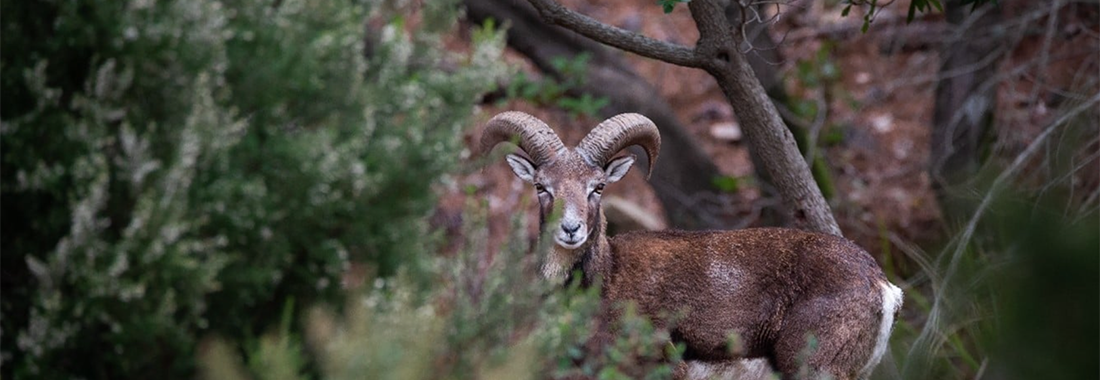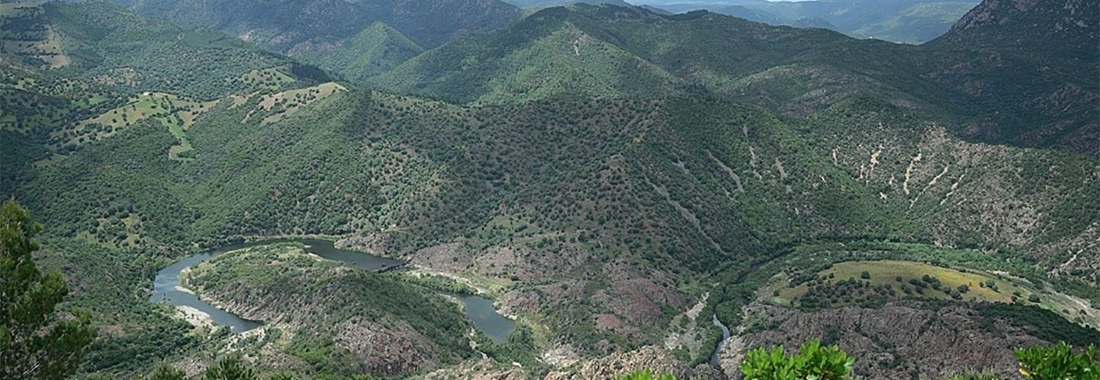The mapping activities of the Tepilora Park are underway for the construction of the lookout points, huts and wooden turrets for the observation of birdlife. Thanks to these structures, you will be able to immerse yourself in the habitat of the very rare Sultan Chicken, the Pink Flamingo or the Marsh Harrier among the reeds and the articulated branches of the wetland and ponds of Rio Posada, a RAMSAR area of international importance, recently recognized in 2021, with the technical support of the MEDSEA Foundation. And again, it will be possible to observe the enchanting meadows of water lilies along the slow flow of the waters of the Rio Mannu and Posada on the Lodè side. In the woodland compendium of Usinavà in Torpè and in those of Crastatza and Littos in Bitti it will be possible to observe mouflons and fallow deer, the golden eagle and that of Bonelli, and many other species of birds of prey.
The project, funded by the Regional Department of Defense of the Environment in Sardinia, with 120 thousand euros, is going through a phase of partial review in recent weeks in the definition of the best sites for positioning the observation points. A journey undertaken together with tour operators, environmental, sports and cultural associations operating in the protected area, and citizens, who in the last two months have actively taken part to a series of meetings promoted by the Tepilora Park Authority.
“Telling the Park and making it accessible to different types of visitors cannot be done without taking into account the indications from those who have lived and discovered every corner of our protected area for many years”, explains the director of the Park, Marianna Mossa. There are points so hidden and difficult to reach that only a few experts can let us know. The information tour, which has just ended, in the four municipalities of the protected area (Bitti, Torpè, Posada and Lodè) has allowed us to meet hundreds of citizens who have shared experiences and information ".
The huts will be built both in the fluvial and wetlands areas, where the ease of observation is much greater, both for the number of species that populate these habitats, and for the ease with which they can be seen, and in the transitional areas of the wooded areas where there is the possibility of observing fauna species of both ecosystems, which move from one area to another.
The creation of small infrastructures, such as perches or platforms on the water near the huts, increases the possibility of observation and encourages the presence of species. In this way, a double function is carried out: the chances of photographing the animals are improved and their settlement is facilitated, recreating the ideal conditions for nesting or feeding - which can, among other things, be encouraged by creating artificial nest boxes.
"Our communities have a truly unique environmental heritage at their disposal, often little known even by those who live there. It is incredible that there are locals who have never been to the forests of Littos and Crastatza or Torpeini who have never admired the island of Tavolara from the peaks of Punta Coloredda in Usinavà. Here, hand in hand with our proposing ourselves to the world, we must ensure that even the inhabitants of the villages of the Park can learn more and more about the beauty that surrounds them ", concludes Mossa.
Pics by Parco Tepilora www.parcoditepilora.it
Latest news

MEDSEA Launches the Wetland4Change Project in Terralba to test and validate climate change's solutions
On Friday, March 14, 2025, in the council chamber of Terralba, MEDSEA held a meeting with the Municipality of Terralba to officially introduce Wetland4Change to stakeholders (productive activities, as well as institutional…

In Crete with ARTEMIS to protect seagrass meadows: 2nd Consortium Meeting
From March 4th to 6th, 2025, Heraklion (Crete) hosted the mid-term meeting of the ARTEMIS Interreg Euro-MED Natural Heritage project, organized by the Hellenic Marine Research Centre. This was a crucial moment to…

MEDSEA Heads to Tallinn for the Blue4All Consortium Meeting
Last January, the Blue4All project team gathered in Tallinn for the Consortium Meeting, marking the project's halfway point. The event, hosted by the local partner Keskkonnaamet/Estonian Environmental Board and the University of Tartu, brought together all 22 project partners from across…

ImPelaghiamoci: A Year of Initiatives to Learn About and Protect Cetaceans with the Municipality of Sassari
Promoting greater knowledge of the resident cetaceans in the Pelagos Sanctuary*, a transboundary marine protected area encompassing France, Liguria, Tuscany, and Sardinia, to improve the protection and conservation of these species…

Reforestation Operations Resume in Montiferru: A Forest for Bees by MEDSEA
Reforestation efforts in Montiferru, led by MEDSEA, are back on track. Following the planting of the first 5 hectares of olive trees, holm oaks, and Mediterranean shrubs, the focus now shifts to melliferous plants to…

25 Events in Sardinia for World Wetlands Day
Wetlands such as ponds, lagoons, lakes, rivers, and peatlands form an endless world of aquatic ecosystems. In Sardinia, the call to explore these habitats is open this February with the Sardinian edition of World Wetlands Day.

COASTRUST: Launching Sustainable Coastal Management in Domus de Maria Sardinia
The activities of the COASTRUST project, funded by the European Interreg Euro-MED program, have officially begun in Sardinia. The initiative aims to promote shared environmental management in the Mediterranean's coastal areas, addressing anthropogenic pressures…

Join the World Wetlands Day Sardinia 2025 Calendar: register your Event by January, 22nd
World Wetlands Day is celebrated every year on February 2, marking the adoption of the Convention on Wetlands signed on February 2, 1971, in Ramsar, on the shores of the…

MEDSEA joins the Camargue Red Alert with the Mediterranean Alliance for Wetlands to save birdlife
The MEDSEA Foundation has officially joined 73 other international organizations in signing the Camargue Red Alert, a collective call to action to safeguard the Camargue wetlands in France.

Wetland4Change: MEDSEA in Valencia to Explore Natural Climate Solutions Through Wetlands
The MEDSEA team participated in the second Consortium meeting of the Wetland4Change project in Valencia from November 26 to 28, 2024. The meeting was organized by local project partners, the…

Malta’s First Posidonia Meadow Restoration Project Led by MEDSEA Foundation
Different islands, but similar issues for marine ecosystems, which are heavily threatened by unregulated anchoring from recreational boating and illegal trawling. In Malta, as in Sardinia, the damage is particularly…

We are all at 'Valencia'-like risk, and here’s why
Le recenti inondazioni a Valencia sono un esempio tangibile di come gli eventi estremi legati al cambiamento climatico stiano aumentando in frequenza, intensità e durata, colpendo duramente il Mediterraneo, un vero e proprio…

Monitoring of Posidonia oceanica Meadows Begins in the Marine Protected Area of Capo Testa Punta Falcone
The monitoring activities of the Posidonia oceanica meadows in the Marine Protected Area (MPA) of Capo Testa Punta Falcone, located in Santa Teresa Gallura, have officially begun. In recent days, the marine…

MEDSEA joined the 7th TransformAr Consortium Meeting in Exeter
In Late September, the seventh Consortium Meeting of TransformAr took place in Exeter in South West England, organised by the partner Westcountry Rivers Trust, who are coordinating the Nature Based solutions in the…

Architecture and Environment of Wetlands at Costa Produttiva, September 8-14 in Marceddì
From September 8 to 14, Marceddì (OR) hosted Costa Produttiva, a multidisciplinary workshop that combines research, innovation, and sustainability for the future of our coasts. Organized by the DICAAR of the…

Festambiente Award by Legambiente to the Mussel Shell Island at the Nieddittas Mussel Facility
This summer, the Biodiversity Award 2024 - Assunta Maria Brachetta Festambiente by Legambiente was awarded to Nieddittas for their project of creating an island from mussel shells, in collaboration with MEDSEA, off the coast of…
- 1
- 2
- 3
- 4



